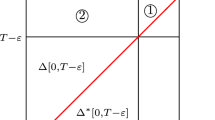Abstract
In this paper, we study a partially observed recursive optimization problem, which is time inconsistent in the sense that it does not admit the Bellman optimality principle. To obtain the desired results, we establish the Kalman–Bucy filtering equations for a family of parameterized forward and backward stochastic differential equations, which is a Hamiltonian system derived from the general maximum principle for the fully observed time-inconsistency recursive optimization problem. By means of the backward separation technique, the equilibrium control for the partially observed time-inconsistency recursive optimization problem is obtained, which is a feedback of the state filtering estimation. To illustrate the applications of theoretical results, an insurance premium policy problem under partial information is presented, and the observable equilibrium policy is derived explicitly.
Similar content being viewed by others
References
Strotz, R.: Myopia and inconsistency in dynamic utility maximization. Rev. Econ. Stud. 23, 165–180 (1955)
Goldman, S.: Consistent plans. Rev. Econ. Stud. 47, 533–537 (1980)
Krusell, P., Smith, A.: Consumption and savings decisions with quasi-geometric discounting. Econometrica 71, 366–375 (2003)
Peleg, B., Menahem, E.: On the existence of a consistent course of action when tastes are changing. Rev. Econ. Stud. 40, 391–401 (1973)
Pollak, R.: Consistent planning. Rev. Econ. Stud. 35, 185–199 (1968)
Vieille, N., Weibull, J.: Multiple solutions under quasi-exponential discounting. Econ. Theory 39, 513–526 (2009)
Ekeland, I., Lazrak, A.: Being serious about non-commitment: subgame perfect equilibrium in continuous time. Preprint, University of British Columbia (2006)
Ekeland, I., Privu, T.: Investment and consumption without commitment. Math. Financ. Econ. 2, 57–86 (2008)
Björk, T., Murgoci, A.: A general theory of Markovian time inconsistent stochastic control problems. SSRN: http://ssrn.com/abstract=1694759 (2010)
Peng, S.G.: A general stochastic maximum principle for optimal control problems. SIAM J. Control Optim. 28(4), 966–979 (1990)
Hu, Y., Jin, H., Zhou, X.: Time-inconsistent stochastic linear-quadratic control. Preprint (2011)
Bensoussan, A.: Stochastic Control of Partially Observable Systems. Cambridge University Press, Cambridge (1992)
Huang, J., Wang, G., Xiong, J.: A maximum principle for partial information backward stochastic control problems with applications. SIAM J. Control Optim. 48(4), 2106–2117 (2009)
Xiong, J., Zhou, X.: Mean-variance portfolio selection under partial information. SIAM J. Control Optim. 46(1), 156–175 (2007)
Li, X., Tang, S.: General necessary conditions for partially observed optimal stochastic controls. J. Appl. Probab. 32, 1118–1137 (1995)
Tang, S.: The maximum principle for partially observed optimal control of stochastic differential equations. SIAM J. Control Optim. 36(5), 1596–1617 (1998)
Yu, X.: An explicit example of optimal portfolio-consumption choices with habit formation and partial observations. arXiv:1112.2939 (2012)
Yong, J., Zhou, X.: Stochastic Controls: Hamiltonian Systems and HJB Equations. Springer, New York (1999)
Wu, Z.: The stochastic maximum principle for partially observed forward and backward stochastic control systems. Sci. China 53(11), 2205–2214 (2010)
Wang, G., Wu, Z.: Kalman–Bucy filtering equations of forward and backward stochastic systems and applications to recursive optimal control problems. J. Math. Anal. Appl. 342, 1280–1296 (2008)
Pardoux, E., Peng, S.G.: Adapted solutions of a backward stochastic differential equation. Syst. Control Lett. 14, 55–61 (1990)
Duffie, D., Epstein, L.: Stochastic differential utility. Econometrica 60, 353–394 (1992)
El Karoui, N., Peng, S.G., Quenez, M.C.: Backward stochastic differential equations in finance. Math. Finance 7, 1–71 (1997)
Hu, Y., Zhou, X.: Constrained stochastic LQ control with random coefficients and application to portfolio selection. SIAM J. Control Optim. 44, 444–466 (2005)
Zhou, X., Li, D.: Continuous-time mean-variance portfolio selection: a stochastic LQ framework. Appl. Math. Optim. 42, 19–33 (2000)
Bjork, T., Murgoci, A., Zhou, X.: Mean-variance portfolio optimization with state dependent risk aversion. Math. Finance (2012). doi:10.1111/j.1467-9965.2011.00515.x
Liptser, R.S., Shiryayev, A.N.: Statistics of Random Process. Springer, New York (1977)
Xiong, J.: An Introduction to Stochastic Filtering Theory. Oxford University Press, London (2008)
Norberg, R.: Ruin problems with assets and liabilities of diffusion type. Stoch. Process. Appl. 81, 255–269 (1999)
Bielecki, T., Pliska, S.: Risk-sensitive dynamic asset management. Appl. Math. Optim. 39, 337–360 (1999)
Nagai, H., Peng, S.: Risk-sensitive dynamic portfolio optimization with partial information on infinite time horizon. Ann. Appl. Probab. 12, 173–195 (2002)
Boswijk, H., Hommes, C., Manzan, S.: Behavioral heterogeneity in stock prices. J. Econ. Dyn. Control 31, 1938–1970 (2007)
Acknowledgements
This work is supported by the Natural Science Foundation of China (11221061 and 61174092) and the Natural Science Fund for Distinguished Young Scholars of China (11125102).
Author information
Authors and Affiliations
Corresponding author
Additional information
Communicated by Francesco Zirilli.
Rights and permissions
About this article
Cite this article
Wang, H., Wu, Z. Partially Observed Time-Inconsistency Recursive Optimization Problem and Application. J Optim Theory Appl 161, 664–687 (2014). https://doi.org/10.1007/s10957-013-0326-4
Received:
Accepted:
Published:
Issue Date:
DOI: https://doi.org/10.1007/s10957-013-0326-4



